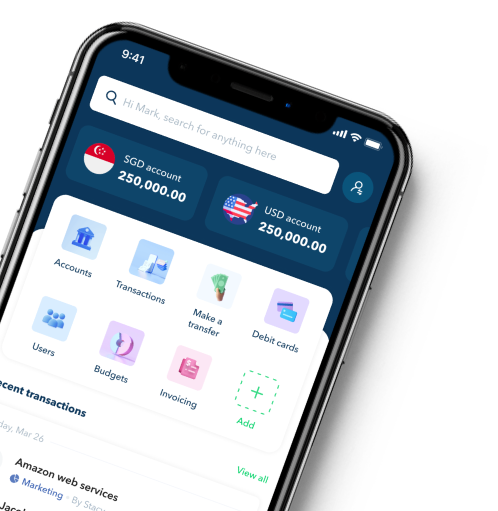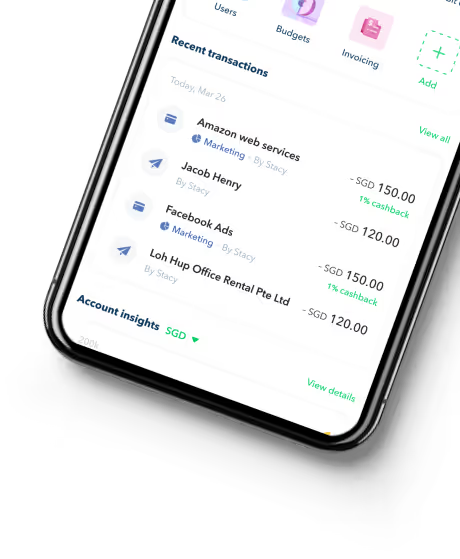Smarter Integration With Aspire's API
Automate your processes and tech stack with our APIs for full automation and control

Trusted by 50,000+ modern businesses
Automate everything with precision
Make mass payments to your suppliers or vendors, connect to your e-Commerce platforms or your accounting software
Reduce errors caused by manual processes, while enforcing compliant spending with approvals, budgets, and other speeded spend management capabilities
Aspire’s Developer-friendly API, sandbox environment, and dedicated support simplifies every step of integration
APIs that scale with your business
Fast, secure, programmatic payouts worldwide
Automate payouts directly from your Aspire multi-currency business accounts
Send international payments in 30+ currencies at great FX
Enjoy fast local payouts in as little as one business day

Issue virtual cards to your teams at scale
Gain real-time visibility of company spend of each card used by your teams
Set spend limits with merchant locks, transaction controls to prevent misuse
Issue virtual cards to pay in 30+ currencies in real-time

Connect to your e-commerce platforms
Easily integrate our payment APIs with popular e-commerce platforms - Woocommerce, Magento, Odoo, and more
Know your code? Connect to our payment API service with just a few lines of code
Get dedicated onboarding assistance from our care team for faster deployment

Developer friendly, easy-to-integrate APIs
Access clear, concise API documentation made for developers
Access your own sandbox testing environment for seamless testing and integration
Get notified on transfer status in real time with webhooks

Hear it first from our customers


Gregory Van
CEO of Endowus


Holly Qian
Head of Finance, First Page Digital


William Chong
Finance Director at Glints




FAQ about Aspire APIs
Card Issuance FAQ
What is a Card Issuance API?
A card issuing API (Application Programming Interface) is a set of tools and protocols that allows developers to integrate card issuance and management functionalities into their applications or platforms. These APIs enable businesses to create, distribute, and manage virtual or physical payment cards. Here are some key features and functionalities typically provided by card issuing APIs:
- Card Creation: Generate new virtual or physical cards with specific parameters (e.g., card type, spending limits, expiration dates).
- Card Activation: Activate issued cards for use by the cardholder.
- Card Management: Update card details, set spending limits, freeze/unfreeze cards, and handle card renewals or replacements.
- Transaction Monitoring: Track and manage transactions made with the issued cards, including real-time notifications for spending activity.
- Compliance and Security: Ensure that card issuance and usage comply with relevant regulatory requirements and incorporate security features to protect against fraud.
- Customization: Personalize cards with branding elements such as logos, colors, and designs. Integration with Payment Networks: Connect with payment networks like Visa, Mastercard, or others to enable transactions.
How does Card Issuance APIs work?
Card Issuance APIs allow businesses (e.g. e-commerce platfroms, marketing agencies etc.) to facilitate card issuance and management via card issuing platforms (e.g. Aspire, PayPal, Stripe etc.).
There are usually multiple steps involved in the Card Issuance API process. The first step is authentication, in which the company gives the API specific instructions, then authenticated by an API key. These instructions include elements like the customer's identity, the kind of card to be issues, spending caps, and so forth.
The issuing platform then undertakes validations and compliance checks to ensure the request meets the regulatory requirements, card network protocols and other predefined validations.
Once approved, the API uses the details provided in the API call earlier to create the cards by setting up business accounts, spending limits, card type etc. For physical cards, activation may be required, while virtual cards are usually activated automatically.
The process concludes with the API sending confirmation, from the issuing platform to the business, about each issued card, including card details and user information. The API also enables businesses and individual users to manage their cards, make transactions, and track their spending in real-time.
What are the benefits of using a Card Issuance API?
Card Issuance APIs provide several advantages - faster time-to-market, more personalization, real-time spend tracking, higher financial transparency, better risk and compliance management, and more control over card features and restrictions are a few of these. Additionally, it enables companies to better serve customers, employees and vendors while promptly adapting to changing market demands.
Payout API FAQ
What is payout?
A payout generally refers to the distribution of funds or rewards to individuals or entities following a transaction or agreement. This could involve disbursing payments, earnings, dividends, or incentives to shareholders, employees, or partners.
How does Aspire's Payout API work?
Aspire's Payout API seamlessly integrates your 3rd party software to your Aspire multi-currency business account via API. Through this integration, you gain the ability to automate and streamline your payout processes, facilitating efficient fund distribution to suppliers, employees, and partners. This integration ensures efficiency and convenience in managing your business's payments while leveraging the benefits of Aspire's robust payment capabilities.
What can I do with a Payout API?
With a Payout API, you can automate the distribution of funds to various recipients such as suppliers, employees, and partners, saving time and reducing manual errors. Seamlessly integrate the API into your existing systems to streamline financial processes and enhance operational efficiency. Additionally, track and monitor transactions in real-time, providing transparency and control over your payout operations.
Payment Gateway FAQ
What is payment gateway?
A payment gateway is a secure network that allows customers to transfer funds to you. It acts as a bridge between a customer's bank and an online merchant's website or application during a financial transaction. Its primary purpose is to authorise and process payments, ensuring that sensitive financial data is transmitted securely.
What is an example of a payment gateway?
There are various reliable payment gateways to choose from for online transactions. Notable ones include PayPal, Stripe, Square, and Authorize.Net.
What is the best payment gateway site?
Selecting the best payment gateway site for your business is crucial for seamless and secure online transactions. While several options are available, it often comes down to your specific requirements. Stripe and PayPal are popular choices, known for their versatility and global recognition. Stripe's developer-friendly interface and PayPal's widespread acceptance make them strong contenders. Additionally, consider factors like transaction fees, supported payment methods, and the ease of integration when making your decision. Ultimately, the best payment gateway will align with your business needs and provide a seamless checkout experience for your customers.









